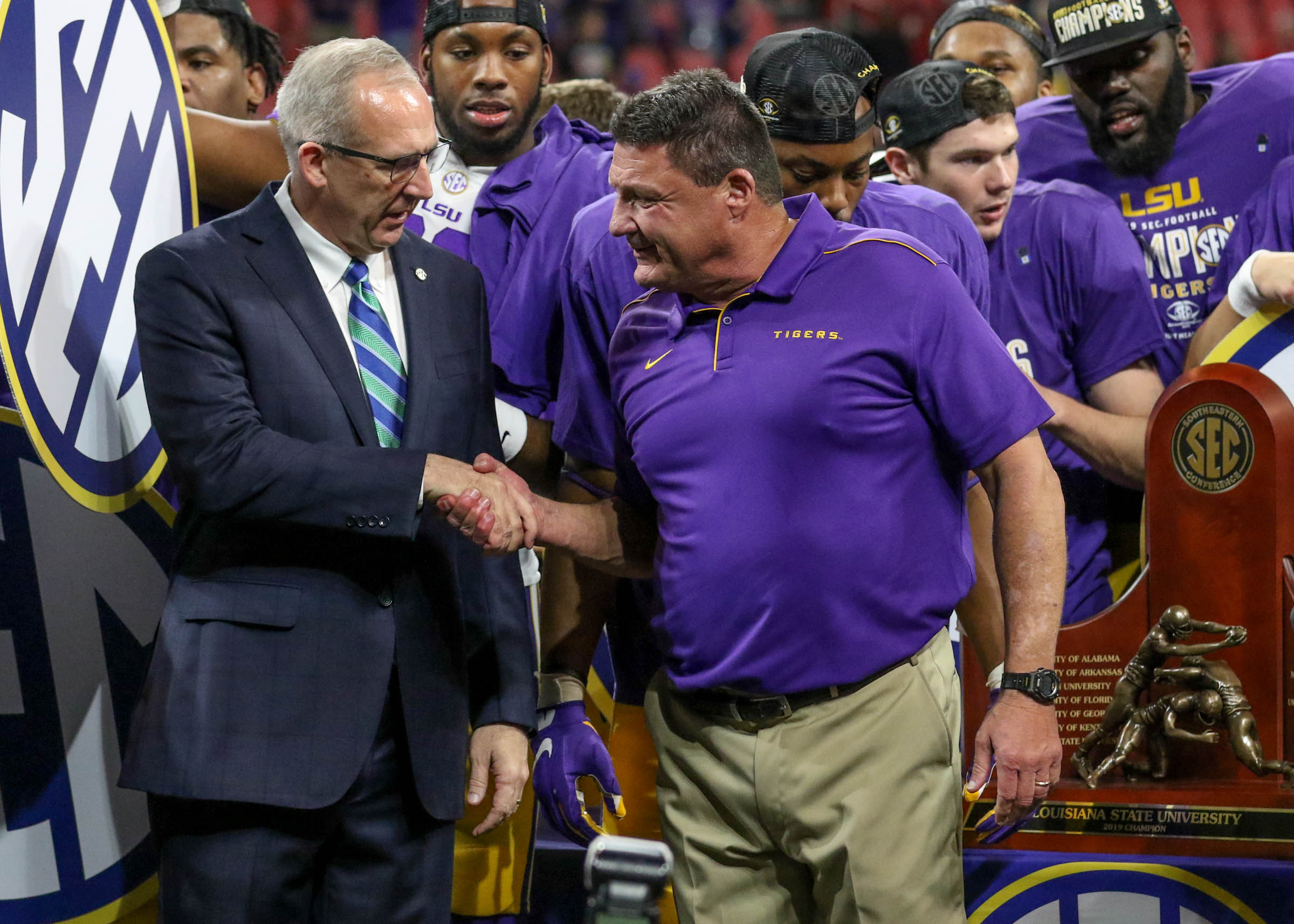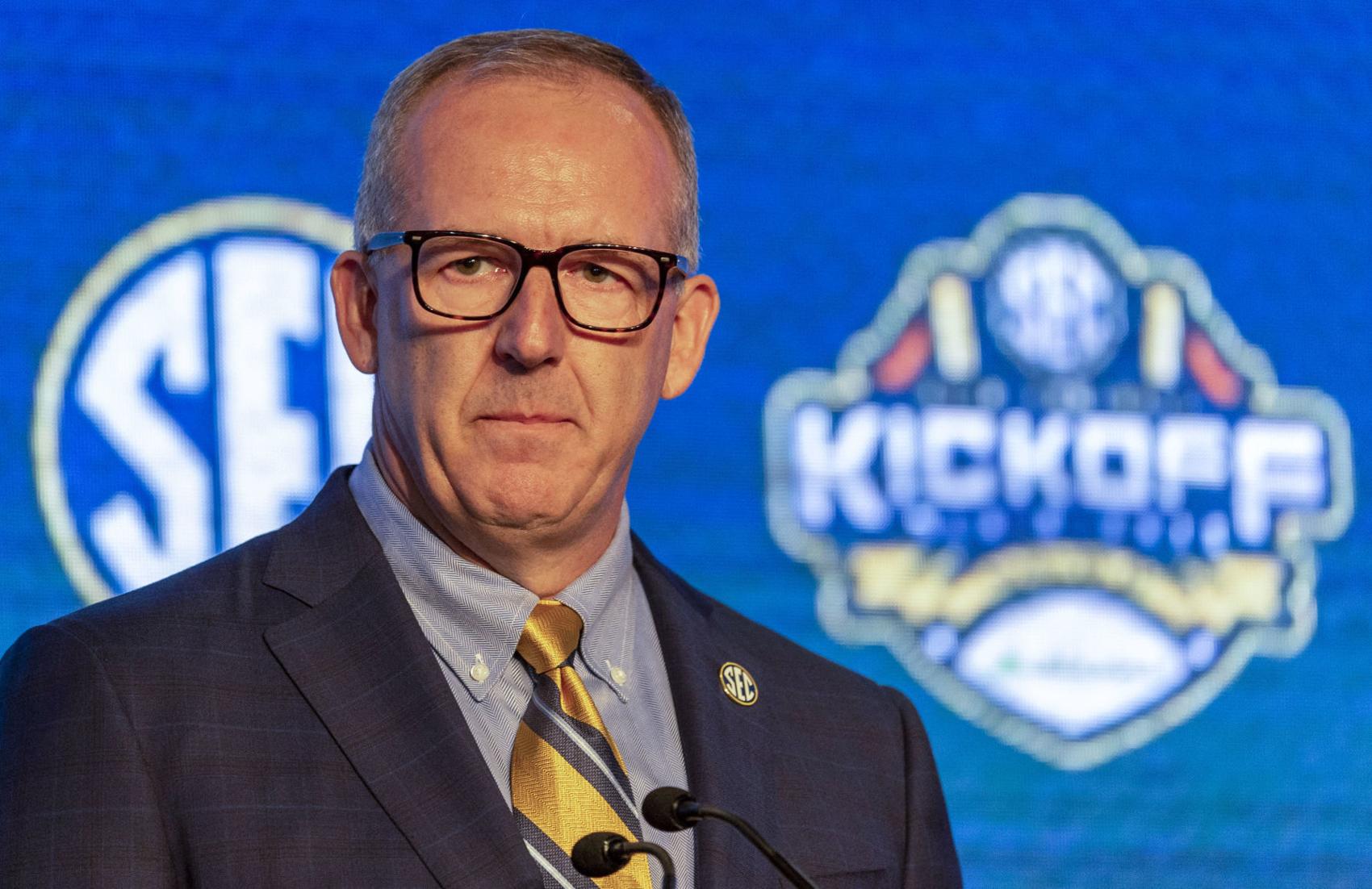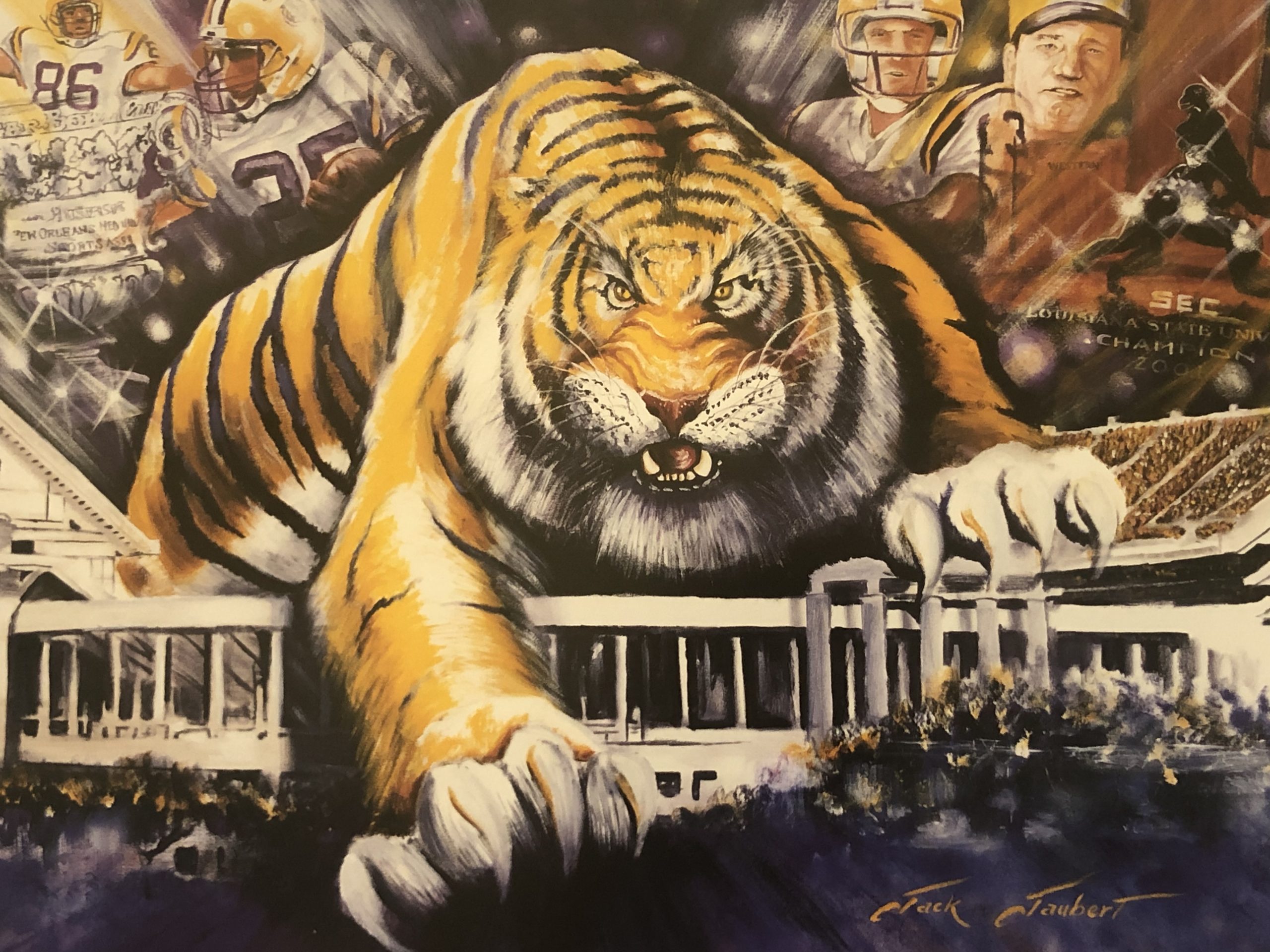
This is a transcript of SEC commissioner Greg Sankey’s Thursday morning press conference in Nashville when he announced the rest of the men’s basketball tournament and all SEC member sporting events were being cancelled through March 30 due to the coronavirus.
GREG SANKEY:
Thanks. I did not expect to be back this quickly, but some people asked, and I
knew that potential was present. It was five years ago literally at this moment
that I walked into a meeting of our presidents and chancellors to be told that
I was going to be the eighth commissioner of the Southeastern Conference, and
we’ve had a lot that’s happened in those five years, a lot that’s great, a lot
that’s difficult. That’s the role when you step into a leadership position.
But I’ve not had a situation as difficult and emotional as this one to make a
recommendation to our presidents and chancellors that we cancel the remainder
of our men’s basketball tournament. It was a moment where I had to stop and
actually catch myself and recompose myself.
I tell you that simply to say there’s no one in this conference who’s taken
these decisions lightly, and I would not want to work with another set of
presidents, chancellors, and athletic directors in the world. I have the utmost
respect for each of the campus leaders and thank them for their engagement,
their work, their consideration, their discussion, and support during the past
24 hours.
I also want to say to our coaches I’ve not been able to reach each of our 14
men’s basketball coaches. When we made the decision, we had some succeeding
decisions to be made. So, first was the cancellation of the remainder of the
SEC Men’s Basketball Tournament, which then raises the question what do you do
with regular season competition? All regular season competition involving SEC
teams with one exception I’ll speak of has been suspended through March 30.
That one exception is NCAA Championship events that may be conducted, which
will be subject to NCAA authority from a participation standpoint and
institutional decision-making.
Practically, we have teams in Albuquerque at the Indoor Track and Field
National Championship. The NCAA has adjusted their format or their support. The
access around that created what I’ve learned is called community space among
people. We’re not going to interfere with those out there. There’s a Swimming
and Diving National Championship coming, Gymnastics nationally, we’ll see the
status of those, in addition to the Men’s and Women’s Basketball Tournaments
that the NCAA sponsors.
For us it means we’re not playing basketball in Nashville the remainder of the
week. Part of the hurt here is the city’s been through a lot in the last couple
of weeks. I don’t have a Nashville Strong T-shirt, I will, because we’re a part
of this community through our events, through our annual presence, our media
days that are coming, our basketball tournaments that are here annually well
into the 30s.
We have a special relationship here, and I want to say to the mayor, to the
people of this great city, to the Predators, the Sports Foundation, the
Convention and Visitors Bureau, how much we appreciate them, and there is
sorrow in our heart too for having to adjust.
To our fans, I know there will be a great deal of frustration. There was last
night a lot of bewilderment. We have a public health situation in this country
and across the globe that is emerging. I’m not an epidemiologist. I’m not a
researcher in immunology or infectious disease, but those who are engaged at
the NCAA level provided some stark information yesterday that guided the NCAA
to close its tournament to public attendance. That then guided us.
Literally as I walked up here last night, the NBA stopped the game and had a
player diagnosed with coronavirus. I had a text exchange a few moments ago with
Billy Donovan, who’s the first face I saw in that story and is a friend. As you
were asking me, going through my mind is I have a responsibility to care for
people, both our staff, our student-athletes, our coaches, and our fans, and we
made the best decisions possible at the time, but information has developed.
We also had questions from people this morning about, wow, I have to get on a
bus. I’m a tennis student-athlete. I’m not comfortable doing that. I think our
student-athletes in men’s basketball saw what happened in the NBA, and they
look to that, many of them, as the next step in our basketball opportunity, and
it just creates questions. So, this was the appropriate decision made at the
best possible time, even though a difficult time, and it affects our basketball
tournament here and, as I said, other spring sports through March 30th.
A number of you will ask about return to play. We have work to do there. I
don’t have all of the answers. I told my staff I don’t know is a perfectly good
answer from time to time. It can’t just be I don’t know. You’re going to have
to do the work to engage and learn how to answer the question eventually. So,
we’ve created an interim period where we will work with our campuses to
determine how we return to our normal operation. It may not be March 30. It may
be beyond. But that remains to be seen. We’ve identified a time frame where we
can engage in conversation and in decision-making.
Pretty quickly, we’ve talked about recruiting issues, spring practice,
practice. I don’t have all the answers. There’s a rather famous practice —
we’re talking about practice press conference. I don’t want that necessarily to
be me. So, what we said is at the president’s and chancellor’s level we’ll
delegate authority to our athletics directors to make some of these operational
decisions, and that conversation has continued since I departed the room. We’re
not all at destinations at this time.
We may not govern every one of those elements. In fact, the NCAA may need to
engage and quickly govern some of those elements. I’ve sent a text to Mark
Emmert saying the NCAA should engage in on and off campus recruiting policies
and changes and, candidly, restrictions for a period of time while we’re all
dealing with this. That would set everyone on an even plane rather quickly.
With that set of introductory comments, I’ll do my best to answer questions.
Q. Commissioner, I’m sure this will be part of the review between now and
March 30th, but some of the spring sport championships that are fixed date,
fixed location championships, would there be any possibility of those dates
pushing back at all, or will it just be a truncated season?
GREG SANKEY: Our gymnastics championships and equestrian championships
will not happen. Those two are cancelled. Again, those are difficult decisions
and were part of the decision here. We have a March 30th date. The remainder of
spring sports championships are after that date. So, when we go to golf,
tennis, which are the next sets of sports that are up, we’ll have an
opportunity to evaluate and answer that question later, the same for baseball,
outdoor track — excuse me. Softball, outdoor track, and baseball in that
sequence.
I had a question about Destin already too. I haven’t altered that plan right
now.
Q. Greg, you said there was stark information that you were given by the
NCAA. Can you expound on that? Was that just medical information? What exactly
was that information?
GREG SANKEY: I don’t have all of that detail, Adam. We have a
representative on the NCAA board of Governors, Dr. Eli Capilouto. They had a
call that was called suddenly yesterday afternoon, as I understand, and in my
debrief with him, just the overview of that information, what was being shared,
there are six medical doctors on the COVID-19 advisory panel. There’s another
individual who works in international events, security and management, and a
set of former and current student-athletes. They shared information. I don’t
have all of those details, but it was about spread, about the need to interrupt
the potential spread, and the role of college athletics and big events in
engaging in stopping that potential spread.
Q. Greg, have you given any thought to extending eligibility for seniors who
have been affected by this, whether it’s winter sports or spring sports or
whatever?
GREG SANKEY: Not at this point. That would be one of those issues on a
long list of additional items to consider, and I don’t think we have to come to
that conclusion right now.
Q. Greg, I know that a lot’s been going on, but what kind of discussions
have you had with your football coaches about their spring practices? What
discussions have happened there?
GREG SANKEY: I was on a conference call with one of our athletic
departments where that was asked. Our athletic director talked about that
afterwards. We’ve limited the size clearly of on campus events, and campuses
are doing that individually, but I don’t have a prescriptive list right now
around what’s going to happen with spring practice, spring football.
Q. Greg, you sort of already answered this, but how much was it a factor of
a player possibly infecting another player here in the tournament?
GREG SANKEY: That had been on our mind for a number of days and weeks.
We felt with what we knew at that time that we could still move forward. When
you’re about to walk up here, you look at your phone, and you have a text
message, and then you see a story with an NBA coach, Billy, who we all know
from his work here, and the decision in that story that the NBA has suspended
play after a test. Are you going to be proactive or reactive? We felt right
now, given what’s happening, we needed to be proactive at this point.
Q. Commissioner, the SEC Baseball Tournament is going to be in a couple of
months. Any changes or updates to mention about that?
GREG SANKEY: We don’t have any changes right now. That March 30th date
gives us an opportunity to take a step back from a rather intense 24, 36 hours
and consider the direction with the remainder of the spring as scheduled or any
adjustments. Right now, that March 30 date has the most importance, I think, as
a milestone.
Q. Is there going to be a later date?
GREG SANKEY: We’ll see.
Q. Pending whatever decision the NCAA makes about its tournament, would you
allow your schools to go to the tournament in light of the information that you
have?
GREG SANKEY: Part of what we’ve discussed is that subject to NCAA
authority and institutional decision-making, if the NCAA continues with events,
our teams will be able to participate in those championships. Knowing that the
NCAA is digging deeply into these issues, should those events continue, we
think that’s the appropriate approach. Very different than on campus or neutral
site or traveling under regular season competition.
But I think that our national office has some work to do on each of those
elements.
Q. Greg, did you get a sense this morning that coaches, players, those who
are in Nashville maybe didn’t want to play even with playing for the automatic
bid and that sort of thing?
GREG SANKEY: Not that directly. I was here on Tuesday evening before a
dinner I needed to attend to see the teams practicing, and it was Ole Miss with
Kermit and Tom and his team with Georgia. I asked both coaches, are your teams
focused and ready to play? Absolutely was the answer. I took that as what we’d
expect.
Yesterday I think people were focused. I had a question a week ago from a coach
about should we do this, but not necessarily predicting this outcome.
If you’ll allow me a moment, I’m going to tell you a story about 2008 that is
one of my favorite images.
We had a tornado hit the Georgia Dome. Many of you were there and can probably
recall where you were sitting. None of us slept the night. Mark Womack was
leading. Mike Slive was on the basketball committee. So, he was sequestered in
Indianapolis at that time. I was doing what I did at that point. We moved to
Georgia Tech. We had a doubleheader for one team. Georgia-Kentucky played.
Georgia won. Georgia won again, and then Georgia won the Championship.
There was a student-athlete on that team walking down the hallway carrying our
championship trophy saying, this is the best day of my life. I have felt the
responsibility to give that team another opportunity, but the greater
responsibility is the health and the information that’s come about. That’s to
say this is important, and I think our teams are focused on accessing that opportunity.
In talking quickly now with our coaches, what I’ve heard is those guys look at
the NBA. When that happens at the NBA level, they’re saying you want me to post
up and guard closely and do these sorts of things. So, I think that that
thought, that kind of question in their minds was developing. That’s my sense
from some of the coaches with whom I’ve spoken, and I’ve not even talked to
half. That’s now been there in a different way.
Thank you for indulging me with my story, but you do a lot of work. A lot of
it’s never seen. A lot of it’s questioned. We have staff over there who are
filled with questions like you, and those types of moments are motivation.
Q. Speaking of being proactive rather than reactive, there’s a lot of
momentum with events being cancelled, and I wonder what sense you have about
the NCAA Tournament, whether it’s going to be played?
GREG SANKEY: They have a tough road ahead in decision-making. I think
any of you can judge reactively or proactively. We played last night, and then we
reacted. You make the best decisions possible with the best available
information. The NCAA leadership is going to have to make that. I won’t judge
right now what the outcome may be. There’s a pause. They’ve got some time,
candidly, that I did not have today, and I would encourage them to use time to
fully evaluate, be thoughtful, and determine whether or not we might be able to
go forward with any of the NCAA Championships in this relatively short window.
So you have wrestling, Missouri has the sport of wrestling. I haven’t checked
the qualifiers. I mentioned indoor track and field, obviously basketball.
That’s why we’re here, both men’s and women’s. Gymnastics. I hurt for all those
student-athletes. It just means more. You saw a little bit of that emotion, but
I know the pride that exists in this conference for having the access to
National Championships is meaningful to young people.
Q. Greg, you mentioned there’s no prescriptive list for football, but would
you as an office recommend coaches be pulled back, or would there be any sort
of discussion about recruiting, avoiding just being out on the road right now?
GREG SANKEY: I’ll go larger. There’s no list for any of this. I have an
undergraduate degree, a Masters degree from Syracuse. This was never in one of
my Masters classes. We have a few law degrees in their offices. I checked with
each of them. No, they never had this one in our law school classes. So that’s
reality. We’re learning. We’re making the best decisions on the best available
information.
We did have conversations about recruiting I referenced and have stopped off
campus and on campus recruiting for a period of time. That could be extended.
I’ve identified the NCAA needs to fully engage on this issue as well. The
practice issue may be for them nationally. I think we had some conversations. I
don’t know that we came to a destination, so that means it’s still on that list
that we’re creating.
Q. Greg, we saw last night with the decision to keep fans out and then this
morning with cancellations around the country, it’s kind of a chain reaction
from conference to conference. How much were the decisions here at the SEC done
in consultation with other commissioners like yourself from other leagues and
the NCAA?
GREG SANKEY: I’ll give just a commendation to my colleagues in what are
called the autonomy conferences, to Larry, to Bob — Kevin’s brand new. He
walked into this. Jim lives down the street. He picked the perfect time to
retire, it appears, for this one, and to John as well. We do talk. We obviously
have common issues to talk about on a regular basis, but our communication has
accelerated.
We’ve all made independent decisions, but as I talk about best available
decision based on best available information, that collaboration helps provide
better and best available information. We all had to go back to our own boards
and act independently. We did that. We could have made a different decision,
but I think somebody asked me the timing last night. We knew at 5:45 Central
that they were going to adjust our attendance for the following day, and today
I think we had a call at 10:30 this morning knowing that we had a noon tip-off
and we needed to move quickly to make this decision today.
That was our independent decision, but the ability to collaborate is the kind
of work that leaders should do at this level.
Thank you everyone. Appreciate your interest and your coverage. I know you have
a job to do, and you’ve got some space to fill that you didn’t expect to have
to fill in different ways the next couple of days. So, thank you for your work.



Be the first to comment